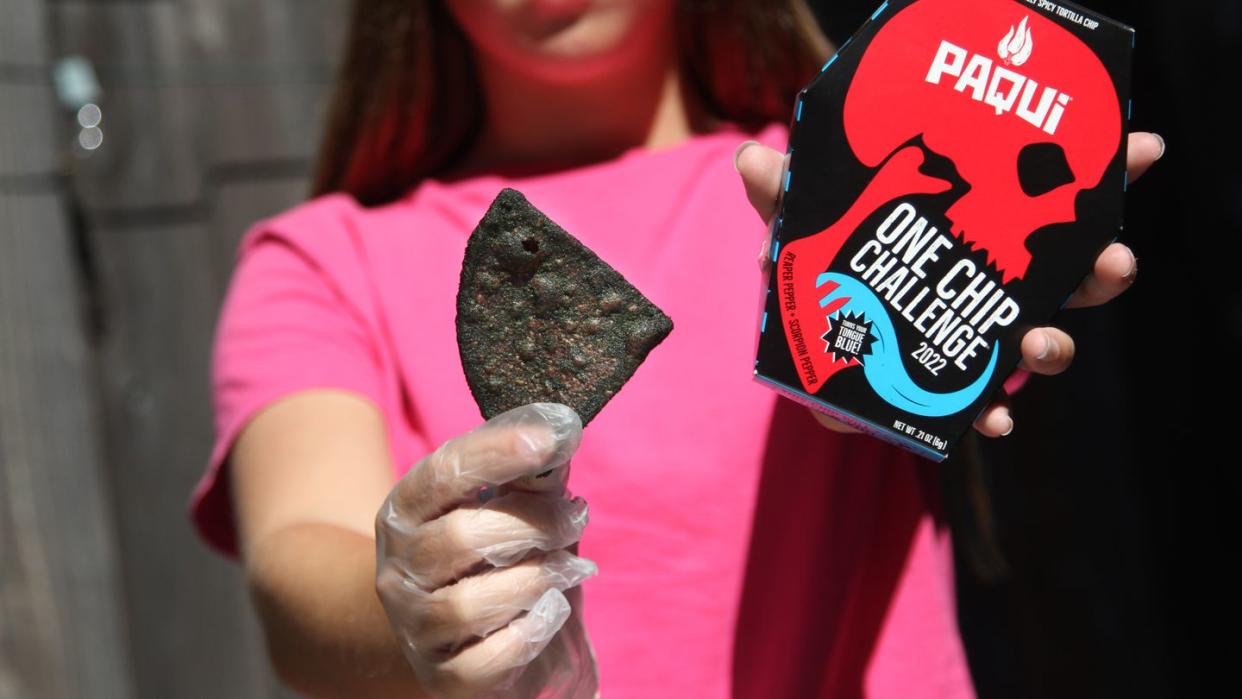Dangerous 'One Chip Challenge' Is Linked To Massachusetts Teenager's Death

"Hearst Magazines and Yahoo may earn commission or revenue on some items through these links."
The “One Chip Challenge” is making headlines after it was tied to a teenager’s death.
Harris Wolobah, 14, a sophomore at Doherty Memorial High School in Massachusetts, died of "cardiopulmonary arrest in the setting of recent ingestion of food substance with high capsaicin concentration," according to a May 2024 medical examiner's report obtained by The New York Times. Capsaicin is the chemical compound found in chili peppers which causes a spicy feeling, per WebMD.
Wolobah ate a single spicy Paqui tortilla chip hours before his death, his mother told the Times.
Wolobah’s death has raised a lot of questions about the "One Chip Challenge," as well as what it can do to your body. Here’s what to know.
What is the “One Chip Challenge”?
The “One Chip Challenge” is a challenge created by the brand Paqui, which encourages consumers to eat one of the company's very spicy tortilla chips. The chip is dusted with Carolina Reaper and Naga Viper, two extremely hot peppers.
The chips were packaged in a container with a coffin-shaped box with an image of a skull with a snake coiled around it. Marketing materials for the chip told people to wait as long as they could after eating the chip before eating or drinking anything, and to post their reactions on social media, the Times reports.
This isn’t a new phenomena. There are YouTube videos going back to 2016 of people trying the chip and posting results of themselves looking seriously uncomfortable.
What does the “One Chip Challenge” do to your body?
Videos that people have posted online show disturbing results. In one video, a man is so uncomfortable, he douses himself with a gallon of milk to try to get relief, before announcing that he “threw up everywhere.”
The big issue with the challenge is that the chips contain high levels of capsaicin, which is the chemical compound found in chili peppers which causes that spicy feeling. Acute exposure to capsaicin can lead to a burning feeling in the mouth and stomach, nausea and vomiting, chest pain, stomach pain, and trouble breathing, according to research published by the National Institute of Health.
A Massachusetts teen died after attempting it, and other children have been hospitalized.
Wolobah died within hours of eating the chip, his mother Lois Wolobah told the Times. On Sept. 1, 2023, she says Harris’ school called to say that he was sick; when she arrived to pick him up, Lois found him doubled over with stomach pains.
Two hours later, he was taken to the hospital, where he passed away.
Wolobah's exact cause of death was deemed a cardiopulmonary arrest “in the setting of recent ingestion of food substance with high capsaicin concentration,” according to People. The autopsy found that Harris also had an enlarged heart and a congenital heart defect, which his family wasn’t previously aware of.
While Wolobah is believed to be the first person who died soon after eating the chip, it's been linked to other illnesses in kids. School officials in California and Texas told Today in 2022 that several students were taken to the hospital after eating the chip, and about 30 students in Clovis, N.M., also had health issues after eating the chip, per KOB-TV.
The chips (and challenge) have been discontinued.
About a week after Wolobah's death, Amplify Snack Brands, a subsidiary of the Hershey Company who owns Paqui, said they were pulling the chip from shelves "out of an abundance of caution."
In a statement, the company shared that "the Paqui One Chip Challenge is intended for adults only, with clear and prominent labeling highlighting the chip is not for children." Paqui added that, "we have seen an increase in teens and other individuals not heeding these warnings."
Experts warn against the challenge, but if you do attempt it and experience extreme side effects, the National Capital Poison Center recommends calling Poison Control immediately or going directly to your nearest hospital.
You Might Also Like

